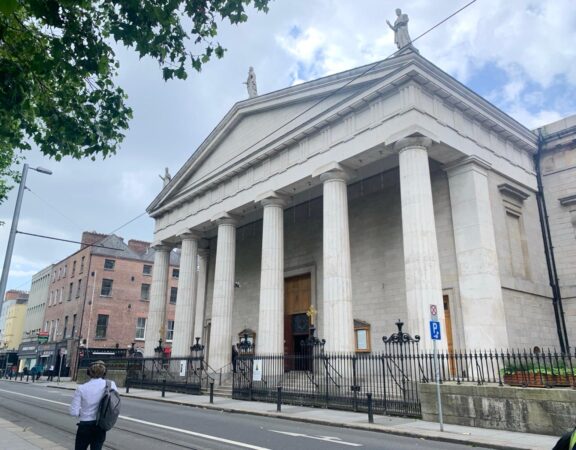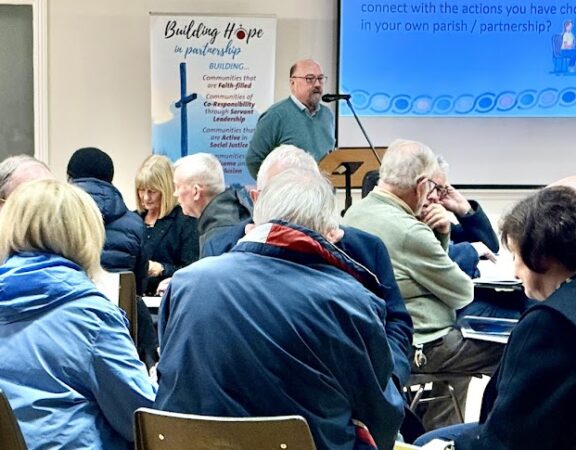HOMILY: World Day of Peace – 1st January 2008
St. Teresa’s Church, Clarendon St. Dublin
Fr. Dermot A. Lane
St. Teresa’s Church, Clarendon St. Dublin
Fr. Dermot A. Lane
Looking back over the year 2007, one is struck immediately by the extraordinary success of the Peace Process in the North of Ireland. We must all be grateful to the many people who made this happen, some of whom are present at this Mass today.
The other, very striking development, in the last twelve months is the growing awareness of the need for humanity to protect the environment, both at local and international levels.
Al Gore’s book and movie, entitled An Inconvenient Truth, the Stern Report from the UK on the economic challenges facing humanity if they are to correct the ecological mistakes of the past, and the recent roadmap put together at the Bali Conference in the middle of December, are indicators of the seriousness of the environmental challenge now facing humanity at this time in history. Discussions about carbon emissions, carbon foot-prints, and climate change have become part of daily discourse.
The message of Pope Benedict XVI for World Day of Peace this year explicitly addresses some of these challenges. The title of his message is: “The Human Family, the Community of Peace”.
What is striking about his message is the way in which he connects peace within the human family and the wider community with emerging environmental challenges. What is also significant is that his message was published on 8th December and that it anticipates many of the concerns expressed at the Bali Conference which concluded on 15th December 2007.
Benedict describes the human family as the living cell, the foundation, and the prototype of society. The human family is the place where we first learn about peace and so he describes the family as the primary agent of peace.
For the family to flourish, it needs a home and that home is the earth and the environment that God has given humanity to inhabit. In the light of this we are called to care for the earth and to protect the environment as a gift from God for all of humanity. The earth is not simply there for our personal interests in the present; it is there also to serve the needs of future generations.
Benedict calls for the creation of “a model of sustainable development” which is capable of supporting the “well-being of all”. He suggests that the cost of sustainable development must be borne justly, taking into account different levels of development that exist within various countries and “the need for this generation to have a sense of solidarity with future generations” (a.7). If this is to happen, then there must be dialogue among the nations rather than unilateral decisions by the few.
Further, he suggests there must be “a search for alternative sources of energy”( a.8). These alternative sources of energy must take account of the common good and be guided by moral norms grounded in nature itself.
Further, urgent attention is required for the stewardship of the earth’s energy resources. This will necessitate a reassessment of the high level of energy consumption and a search for alternative sources of energy.
Effective stewardship of the earth as our home may require, according to Benedict, the establishment of an international agency.
If we are to bring about these changes, there must be shared spiritual and ethical values. In particular, special attention must be given to the poorer countries, and the weak must be protected from oppression by the strong.
Benedict concludes his message by calling for a dismantling of existing nuclear weapons among the nations.
Clearly alarm bells are ringing around our globe about the state of the earth: about the pollution of our environment, about deforestation, about increasing levels of climate change.
It is worth reflecting, therefore, a little further on the challenge presented by Pope Benedict XVI.
The call to care for the earth can only be met by recovering the bond that exists between the human and natural world, by rediscovering the underlying unity that obtains between the story of humanity and the story of the cosmos. Unless we can rediscover the kinship, the deep relationship that exists between the human community and the earth community, we will in truth end up destroying not only the earth, but also the human community.
It is worth remembering that for the greater part of the history of humanity there was a relationship of respect and reverence between humanity and the cosmos. It is only since the time of the Enlightenment, over the last 200 years or so, that the universe has become ‘a disenchanted place’. Nature, through the so-called advances of science, became mechanised with the rise of modernity. Modern science turned nature into an object of exploitation and manipulation for the exclusive gain of humanity – at the expense of the inherent value and beauty and integrity of the natural world as a part of God’s creation.
What is even more fascinating, however, is that modern science itself has begun to correct the wrong turn it took. Since the middle of the 20th century, modern science has rediscovered the deep bond, the intimate relationship and the fundamental unity that exists between the human and the natural world. This has happened through the discovery of the now almost universally agreed story of the “big bang” about the origins of the universe, going back some 15 billion years. In the light of this new cosmic story, we are beginning to see ‘a re-enchantment of the universe’, beginning to appreciate something of the beauty, the integrity and the order of our universe.
For example, we now know that we live in a finely-tuned universe that has been evolving over the last 15 thousand million years, that everything and everybody in that universe is inter-related, interconnected and inter-dependent. Within this perspective, we are now discovering that you and I are made up of stardust, that we are, as it were, cosmic dust in a state of consciousness. With this new consciousness there comes a new freedom and responsibility, especially a new ethical responsibility to care for the beauty and integrity of planet earth.
There can be no doubt that the development of a balanced relationship between humanity and the environment has moved to the centre of the political agenda in a short space of time.
The point being made by Benedict is his message for the World Day of Peace is that this debate must be informed by values, spiritual and ethical values, and not just purely pragmatic considerations. Furthermore, this debate should not be left to unregulated market forces. Instead, the debate must be guided by moral norms.
There is a challenge here for all Christians, for all of the Christian churches working together, to become an environmental lobby, to hear the cry of the earth, to be the voice of the earth, both at local and international levels in the years ahead. Not only is there a challenge for all of the Christian churches, but also for the religions of the world who have an important role to play in raising the consciousness of humanity to its new corporate responsibility for the well being of the earth, and above all for the need to act now to protect the environment for the next generation.
What the churches and the religions can bring to this debate is an awareness that our world, our small blue planet in the midst of vast milky way, is in truth a sacred sanctuary, a dwelling place for the divine, a sacrament of the presence of the Spirit of God. To disturb the integrity of creation is to disfigure the presence of the Creator.
In this regard we have much to learn from the poets. Gerard Manley Hopkins reminds us that our “Universe is charged with the grandeur of God”. Elizabeth Browning points out:
Earth is crammed with heaven
And every common bush afire with God
But only he who sees
Takes off his shoes
While all the rest gather blackberries (“Auro Leigh” 1897).
In this regard we have much to learn from the poets. Gerard Manley Hopkins reminds us that our “Universe is charged with the grandeur of God”. Elizabeth Browning points out:
Earth is crammed with heaven
And every common bush afire with God
But only he who sees
Takes off his shoes
While all the rest gather blackberries (“Auro Leigh” 1897).
In our first reading today we heard the blessing: “ May the Lord make his face to shine upon and give us peace”(Numbers 6:22-27). The Hebrew word for peace is Shalom and the word Shalom in Judaism is about establishing right relations between God and others and nature. To be at peace within Judaism is to be in harmony with the integrity of the earth.
Our second reading(Gal.4:4-7) talks about God sending the Spirit of his Son into our hearts. Again within Judaism, one of the most important prayers was “Send forth your Spirit, O Lord, and you shall renew the face of the earth”(Psalm. 104 :30). If we are to care for the earth and to protect the environment, we will indeed need to be in touch with Spirit, the Creator-Spirit, who holds the whole of creation together (Gen.1:1-3).
Today as we celebrate the Solemnity of Mary, the Mother of God, Mater Dei, we do well to follow her example which was to treasure these words and to ponder them in her heart. Without prayerful reflection, in the spirit of Mary, we may end up with mere knee-jerk reactions, and short term resolutions, to the crisis of environment, when what was is really needed at this time is careful planning for the long term future of our planet.
This message of Benedict XVI, therefore, is a timely reminder for all of us as Christians , for governments, and international agencies of the urgency:
· Of taking action to safeguard the environment;
· Of adopting a new international model of sustainable development for all peoples and nations;
· Of initiating a new stewardship of the earth’s energy resources.
As we face into another New Year, and as we search for worthwhile New Year’s resolutions, why not respond to this challenge issued by Benedict in his message for peace?
· Of taking action to safeguard the environment;
· Of adopting a new international model of sustainable development for all peoples and nations;
· Of initiating a new stewardship of the earth’s energy resources.
As we face into another New Year, and as we search for worthwhile New Year’s resolutions, why not respond to this challenge issued by Benedict in his message for peace?
Why not make a personal commitment to play your part in the protection of the environment? Why not try to reduce your carbon footprint in 2008? Why not try to reduce your energy consumption by doing something as simple as using energy efficient lighting bulbs? Why not try to recycle more and to waste less in our daily consumption of the earth’s resources?
What is now clear for all of us is that as citizens but also as Christians we are called to work for peace, and the path to Peace from now on embraces both people and the care of earth. Amen.







